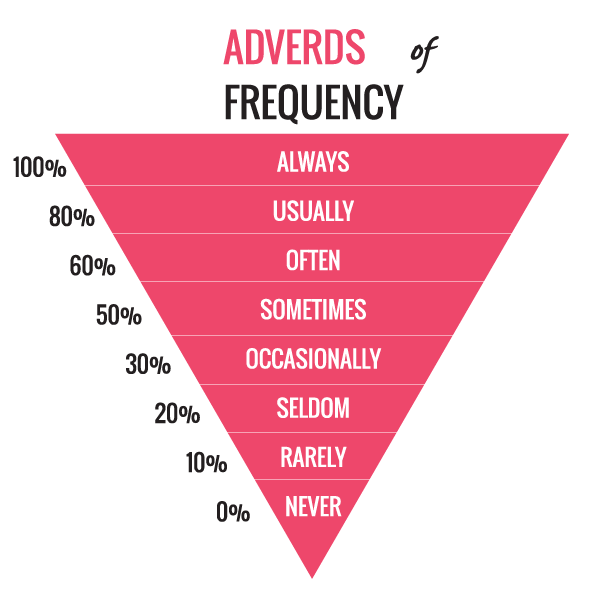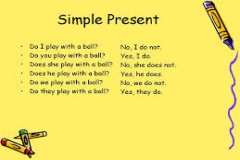Trong Tiếng Anh, thì hiện tại đơn là một trong những thì quan trọng bậc nhất trong cả văn nói và văn viết. Bài viết sau đây sẽ trình bày chi tiết về cấu trúc, cách dùng và đặc biệt là các bài tập thì hiện tại đơn được biên soạn cụ thể. Hãy cùng tìm hiểu ngay bây giờ nhé!
Tóm tắt lý thuyết thì hiện tại đơn

Cấu trúc (Form)
- I, We, You, They + Verb (bare-infinitive)
- He, She, It + Verb + s/es: – Động từ chia ở hiện tại (V)
(Nếu chủ ngữ ở ngôi 3 số ít, ta phải thêm s hoặc es vào sau động từ)
Cách dùng (Usage)
– Thì hiện tại đơn diễn tả một chân lý, một sự thật hiển nhiên,
Ex:
- The sun rises in the East
- They live in England.
- I am a student
– Thì hiện tại đơn diễn tả một thói quen, một hành động xảy ra thường xuyên ở hiện tại.
Ex:
- Mary often goes to school by bicyclė.
- I get up early every morning
- What do you do every night?
– Thì hiện tại đơn còn được dùng để diễn tả hành động sự việc tương lai sẽ xảy ra theo thời gian biếu hoặc chương trình, kế hoạch đã định theo thời gian biểu
Ex:
- The train leaves at seven twenty-three tomorrow morning.
- I’ve got the tour details here.
- We spend three days in Rome.
* Lưu ý: Ta thêm es sau các động từ tận cùng là: o, s, x, ch, sh.
Các phó từ thường được dùng chung với thì hiện tại đơn:

- Often usually, frequently: thường
- Always, constantly: luôn luôn
- Sometimes, occasionally: thỉnh thoảng
- Seldom, rarely: ít khi, hiếm khi
- Every day / week/ month: mỗi ngày/ tuần, tháng
Thể phủ định (Negative form)

– Đối với động từ đặc biệt (be, can, may…), ta thêm not ngay sau động từ đó
Ex:
- He is a good student → He is not/ isn’t a good pupil.
- My brother can swim → My brother can not/ can’t swim.
– Đối với động từ thường ta dùng trợ động từ do với các chủ ngữ I, you, we, they). hoặc does (với các chủ ngữ he, she. it), và thêm not sau do, does.
Ex:
- She likes coffee → She does not doesn’t like coffee.
- They want new clothes →They do not/ don’t want new shoes.
Thế nghi vấn (Interogative form)

– Đối với động từ đặc biệt ta đưa động từ ra đầu câu
Ex:
- You are tired now → Are you tired now?
- Peter can drive a car → Can Peter drive a car?
– Đối với động từ thường, ta thêm do hoặc does vào đầu câu.( nhớ đưa động từ chính về nguyên mẫu)
Ex:
- Her father likes tea → Does her father like tea?
- They do their homework every day. Do they do their homework every day?
Bài tập thì hiện tại đơn

Chia động từ
1. He often (have) ________ dinner at 6.00 pm.
2. Lan’s brothers (be) ________ doctors.
3. Nam’s father (be) ________Mai’s teacher.
4. Mai and Hoa (not be) _________ Mr Tam’s students.
5. You and I (be) good friends.
6. Every morning Lan (get) ________up at 6.
7. I (go) ________to school at 6.30 every day.
8. He (brush) ________ his teeth every morning.
9. Mai (get) ________dressed at 6.50 every morning.
10. Hoa (go) ________to school by bus every- day.
11. He (not live) ________ in Ho Chi Minh city.
12. You (speak) ________ English?
13. My best friend (write)________ to me every month.
14. Her life (be) so boring. She just (watch)________ TV every night.
15. Johan is so smart that he (pass)________ every exam without even trying.
16. He (live) ________ in a house? Marry (try)________ hard in class, but I (not think) ________ he’ll pass.
17. Where your students (be) ________?
18. Our sister (work) ________ in a bank.
19. Dog (like) ________ meat.
20. He (live)________ in California.
21. It (rain)________ almost every day in Viet Nam.
22. We (fly)________ to US every summer.
23. Our mother (fry)________ eggs for breakfast every morning.
24. The bank (close)________ at five o’clock.
25. Marry (try)________ hard in class, but I (not think) ________ he’ll pass.
26. I often (have) ________ breakfast at 6.00.
27. She (have) ________ a new haircut last Monday.
28. My Children (be not) ________ hard working.
29. He (study) ________ on Saturday.
30. I (be) ________ at countryside on Sunday.
Đáp án:
1. has
2. are
3. is
4. are not
5. are
6. gets
7. go
8. brushes
9. gets
10. goes
11. does not live
12. Do you speak English?
13. write
14. is/watches
15. passes
16. lives/tries/ don’t think
17. where are your student?
18. works
19. likes
20. lives
21. rains
22. fly
23. fries
24. closes
25. tries/don’t think
26. have
27. has
28. are not
29. studies
30. am
Hoàn thành câu

1. Sắp xếp câu dưới sau thành câu hoàn chỉnh
1. live / do / where / you?
2. not / is / this / book / my /.
3. in / Hue / live /I.
4. is / classroom / this / your?
5. book / your / close.
Đáp án:
1. Where do you live?
2. This is not my book
3. I live in Hue
4. Is this your classroom
5. Your book close
Chuyển thành câu phủ định
1. Mai brushes her teeth every day.
2. There is a flower on the table.
3. I walk to school every morning.
4. They live in a small village.
5. I am a student.
Đáp án:
- Mai does not brush her teeth every day.
- There is not a flower on the table.
- I don’t walk to school every morning.
- They don’t live in a small village.
- I am not a student.
Bài tập tổng hợp thì hiện tại đơn 1
Fill in the blank with the appropriate verbs from the list (Hãy điền vào mỗi chỗ trống bằng một động từ thích hợp):
get make put be have say
open go take do wash see
1. I ______ up at seven o’clock. I________ the window and _________ my bed. I _______ my morning exercises in front of.the open window. Then I______ my hands and face and wash behind my ears too.
2. I________ back to my bedroom and_______ on my shirt. I_________ my red scarf out of the wardrobe. The wardrobe_______ in the corner of the bedroom. Then I _____ to the kitchen and___________ my breakfast. My sister usually _______ up late and ________ her breakfast at 8 o’clock.
3. After breakfast I_________ my books and exercise-books into my school-bag. Then I________ good-bye to Mother and______ to school.
4. In the street I________ my friends. They go to school too.
Bài tập hiện tại đơn tổng hợp 2

Dùng hình thức dúng của động từ trong ngoặc.
- Miss White’s students (not be)______________
- Lan’s brothers (be)_______________
- Nam’s father (be) __________ Mai’s teacher.
- Mai and Hoa (not be) ___________ Mr Tam’s students.
- You and I (be)_____________ good friends.
- Every morning Lan (get)_______________ up at 6.
- I (go) ___________ to school at 6.30 every day.
- He (brush)____________ his teeth every morning.
- Mai (get) ; dressed at 6.50 every morning.
- Hoa (go)___________ to school by bus every- day.
Đáp án:
1. aren’t
2. are
3. is
4. aren’t
5. are
6. gets
7. go
8. brushes
9. gets
10. goes
Hãy hoàn tất đoạn văn sau, sau dó trả lời các câu hỏi.
Hello. My name (1) ________ Lan. I’m twelve (2)__________ old. I’m a student. I (3) ________ a brother, Nam. He’s (4) ____________ engineer. He’s twenty-seven. We live (5) ________ a house (6)___________ a lake. Our house (7) ________ a yard. Our hcuse is (8)__________ big. It’s small.
* Questions:
- How old is Lan?
- What does she do?
- What’s her brother’s name?
- How old is he?
- What does he do?
- Where do they live?
- What does their house have?
- Is their house big?
Đáp án:
- Is
- Years
- have
- an
- in
- near
- has
- not
Đổi các câu sau sang thể phủ định và nghi vấn.
- Our house has a yard.
- There is a park near the hotel.
- She lives in a house near a lake. –
- He works in a factory.
- They have literature on Tuesday.
- Lan takes a shower every morning.
- Those are her pencils.
- I watch television every night.
- His mother does the housework every day.
- Her brother and sister play sports after lunch.
Đáp án:
1. Our house doesn’t have a yard.
Does your house have a yard?
2. There isn’t a park near ….
Is there a park near…?
3. She doesn’t live….
Does she live…?
4. He doesn’t work….
Does he work…
5. They don’t have….
Do they have…?
6. Lan doesn’t take….
Does Lan take…?
7. Those aren’t her pencils.
Are those her pencils?
8. I don’t watch….
Do you watch…?
9. His mother doesn’t do….
Does his mother do…?
10. Her brother and sister don’t play sports…
Do her brother and sister play sports…?
Như vậy chúng ta đã cùng nhau tìm hiểu về cấu trúc, cách dùng cũng như một số bài tập thì hiện tại đơn. Nếu có bất kì thắc mắc gì về các câu hỏi, kiến thức liên quan đến thì hiện tại đơn, các bạn hãy để lại bình luận dưới bài viết này để chúng tôi hỗ trợ nhé!

Học một ngôn ngữ mới là trở thành một con người mới. Ngôn ngữ là nguồn sống của tâm hồn, là nguyên liệu cho tư duy và là sự thể hiện của tư duy phát triển.

Leave a Reply